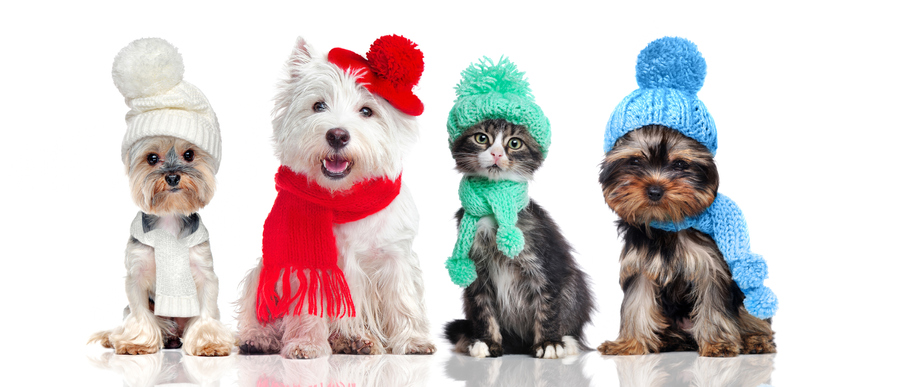
Pet clothing is a confusing subject. When should your clients dress their pets? How can they tell if their pet is OK with wearing clothes? Here’s how clothing can be useful, how the right choices can ensure their pet’s comfort, and how clients can read behaviors to judge their pets comfort.
Protecting Pets in Winter Weather
Cold weather breeds like Huskies have no problem with low temperatures, and most breeds don’t need a coat if they’re only going out to relieve themselves. Puppies, senior dogs, short hairs and dogs with certain medical problems may need a coat to handle winter weather. No matter the breed, booties are a great idea for winter. They protect the paws of their dog from salt and other chemicals, not just cold.
Getting a coat onto a dog starts with getting the right size of clothing. Clients should skip breed recommendations and look for coats that match their dog’s length from its neck to the base of its tail. Before using a coat for weather protection, owners should try putting the jacket on their dog indoors. If the dog freezes in place or fights to get it off, it probably won’t work.
When it comes to cats, it gets a little more complicated. A coat can help cats keep warm and is generally recommended for hairless breeds. However, it’s easy for cats to overheat when wearing thick coats, especially if the cat is a long hair.
The cat’s personality plays a big role in how well it handles clothes. Clothing should never be put on shy cats, as this can lead to trust issues. Like dogs, some cats will stop moving if they’re wearing clothing. However, this doesn’t necessarily mean the cat hates the clothing. The owner should try to offer a treat. If the cat goes after the treat, it just needs time to acclimate to their outfit. Pairing treats with clothing trains the cat to enjoy dressing up. If the cat becomes angry when the clothing is removed, they don’t like it.
With or without clothing, clients should watch for signs of hypothermia. Owners need to bring their pet in if it shivers, holds up its paws, or actively looks for warm places to hide. After a trip outside, pets should be inspected for ice buildup on feet and bellies.
Summer
Dogs and cats can get sunburn, especially if they have light coats or light coloring. Even breeds with thick coats can get sun damage around exposed areas, like ears and paws.
While clothing may protect their pet to a degree, clients need to understand that limiting exposure is the best method to protect their pet. Sun protection clothing for dogs is effective, but the extra fabric can lead to overheating. Likewise, booties may protect their dog from pad burns on asphalt and sand. However, clients still need to watch for burns on their pet’s feet and seek medical attention as needed.
Bandanas: More than Style
Bandanas are a popular dress up option for dogs and cats, but their uses extend past fashion. Bandanas make it easy to recognize animals from a distance. This is handy if the dog is let loose in a dog park. Bright fabric also increases visibility at night. If the dog likes to rub up against things, the bandanna can protect its fur. However, clients need to understand that a bandanna is not a solution for chaffing. If their pet’s collar is causing problems, clients should be encouraged to find a better fitting or more flexible replacement.
Costumes
Some people want to make their pets part of their Halloween celebration, while others like to dress their pets up for cute photos. Most of the techniques used for regular clothing can apply here.
Dogs are more apt to have a bad reaction to costumes that cover part of their head or have leg sleeves. If the costume inhibits movement or affects the dog’s behavior, it needs to come off. Cats are usually OK with hats as long as they don’t interfere with ear movement.
Even if the pet has no problem wearing clothing, there’s one factor that owners tend to forget. Do their pets want the extra attention they’ll get when wearing a costume? While one dog may love the extra pets, another dog may want to run away. Likewise, putting a costume on most cats won’t make them want to be pet by strangers.
Keep Your Patients Stylish and Your Clinic on Your Clients’ Minds
For over 10 years, Positive Impressions, LLC has helped veterinary practices build relationships with their clients. We offer several ways to keep in contact from custom printed reminder cards to veterinary prescription labels . Looking for a different way to promote your clinic? We now have bandannas and collars that can be custom printed with your clinic’s information. Be sure to check out our current specials on our website.
